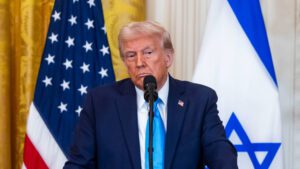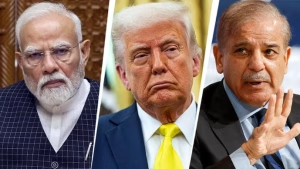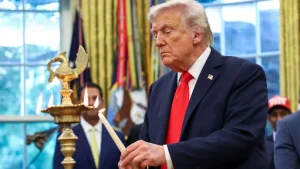Washington D.C. – US President Donald Trump hosted a memorable Trump Diwali celebration in the Oval Office of the White House on Wednesday, where he heaped praise on his “great friend” Prime Minister Narendra Modi while repeating his controversial claim about India halting oil trade with Russia. The event marked a significant diplomatic gesture, combining cultural appreciation with geopolitical messaging during the festival of lights.
During the Trump Diwali celebration, the President made several noteworthy statements about India-US relations, the ongoing Ukraine war, and trade negotiations between the two nations. His remarks offered insights into his administration’s approach to bilateral ties and regional conflicts, while also demonstrating his personal affinity for Indian culture and leadership.
Fourth Russian Oil Trade Claim During Trump Diwali Celebration

Trump once again claimed during the Trump Diwali celebration that India will halt its oil trade with Russia, marking the fourth time he has made this assertion within a week. The President attributed this supposed decision to assurances from Prime Minister Modi, despite India’s official denial that any recent phone call between the two leaders took place regarding this matter.
“He’s not going to buy much oil from Russia. He wants to see that war end as much as I do. He wants to see the war between Russia and Ukraine to end. They’re not going to be buying too much oil. So they’ve cut it way back, and they’re continuing to cut it way back,” Trump stated during the Trump Diwali celebration, linking India’s energy policy to Modi’s desire to see the Ukraine conflict resolved.
Warm Praise for Prime Minister Modi


The Trump Diwali celebration featured effusive praise for Prime Minister Modi, whom the President referred to as both a “great friend” and a “great person.” Trump emphasized the personal relationship he has developed with the Indian leader over the years, suggesting this friendship underpins the broader bilateral relationship between the two democracies.
“I love the people of India. We’re working on some great deals between our countries. I spoke to Prime Minister Modi today and we just have a very good relationship,” Trump declared during the Trump Diwali celebration, connecting his admiration for India with ongoing trade negotiations between Washington and New Delhi.
Trade Negotiations Context
Trump’s remarks during the Trump Diwali celebration came amid ongoing trade negotiations between India and the US, necessitated by the imposition of 50% tariffs on Indian imports. Half of these tariffs were announced as additional penalties specifically targeting India’s business relationships with Russia, demonstrating how the Ukraine conflict has influenced bilateral economic relations.
The President’s positive tone during the Trump Diwali celebration suggests potential progress in resolving trade tensions, though concrete details about any agreements remain undisclosed. The reference to “working on some great deals” indicates active diplomatic engagement at the highest levels.
Also Read: H-1B Visa Fees: Big Relief as US Announces Exemptions for Indians
Pakistan Ceasefire Claim Repeated

During the Trump Diwali celebration, the President also repeated his claim that he brokered a ceasefire between India and Pakistan back in May using trade leverage. “Although we did talk a little while ago about let’s have no wars with Pakistan. The fact that trade was involved, I was able to talk about that. And we have no war with Pakistan and India. That was a very, very good thing,” Trump stated.
This assertion during the Trump Diwali celebration adds another dimension to his narrative about using economic tools to achieve diplomatic and security objectives in South Asia, though the specific details and veracity of these claims remain subjects of debate.
Symbolic Diya Lighting Ceremony


The Trump Diwali celebration included a symbolic moment when the President lit a diya inside the Oval Office, demonstrating respect for Hindu traditions. Trump called the diya lighting “a symbol of faith in the victory of light over darkness,” connecting the religious symbolism to broader philosophical themes.
“It’s knowledge over ignorance and good over evil. During Diwali, the revellers recall ancient stories of enemies defeated, obstacles removed, and captives free. The glow of the Diya flame reminds us to seek the path of wisdom and to work with diligence and to always give thanks for our many blessings,” Trump said during the Trump Diwali celebration, showcasing his understanding of the festival’s deeper spiritual significance.
Distinguished Guests at Trump Diwali Celebration
Several dignitaries attended the Trump Diwali celebration, including Indian Ambassador to the United States Vijay Kwarta and his wife, FBI Director Kash Patel, and Director of National Intelligence Tulsi Gabbard. The presence of these high-ranking officials underscored the importance the administration places on US-India relations and the Indian-American community.
India’s Denial and Trump’s Response
While Trump has repeatedly claimed during the Trump Diwali celebration and on previous occasions that India will soon end its oil trade with Russia, India has consistently denied that any recent phone call took place between Trump and Modi on this specific topic. When previously asked about India’s denial, Trump responded with a veiled tariff threat: “But if they want to say that, then they’ll just continue to pay massive tariffs, and they don’t want to do that.”
Shift in Trump’s India Rhetoric
The warm tone of the Trump Diwali celebration represents a significant shift from earlier in his administration. To pressure Russia into ending its offensive in Ukraine, Trump had imposed an additional 25% tariff on imports from India, the second-largest buyer of Russian oil. After days of targeting India through statements from him and his administration officials, Trump changed his approach back in September and has since made many positive remarks about India and Prime Minister Modi.
The Trump Diwali celebration thus symbolizes not just cultural appreciation but also the evolution of a complex bilateral relationship navigating trade tensions, geopolitical pressures, and personal diplomacy at the highest levels of government.

